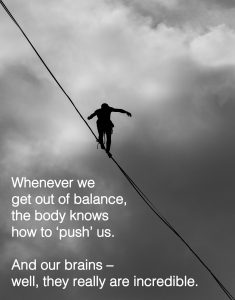by Jem Shackleford
 The human body is amazing. And it’s even more amazing that it mostly looks after itself. Whenever we get out of balance (when we feel cold, hungry or need the loo and so on), the body knows how to ‘push’ us to rebalance, so we shiver, reach for a doughnut or head to the bathroom.
The human body is amazing. And it’s even more amazing that it mostly looks after itself. Whenever we get out of balance (when we feel cold, hungry or need the loo and so on), the body knows how to ‘push’ us to rebalance, so we shiver, reach for a doughnut or head to the bathroom.
And our brains – well, they really are incredible.
Humans are not that strong, nor particularly agile or very fast, but we can think better than any other creature. Our ability to think, remember and analyse has made us the most successful species on the planet (well, we’re not going extinct as a species). But one downside of this phenomenal thinking power is that sometimes we over-think, over-analyse and over-complicate our situations. If you remember that our primary motive, as a species, is to pass on our genes and ensure survival, then you can see that most of our actions are geared towards making sure that we do survive. Unfortunately, this does not always lead to happiness or contentment.
So, if the brain’s job is to keep us safe, it definitely has its work cut out at the moment.
One of the key jobs of the brain is to scan for danger and it is getting plenty of that right now as we’re bombarded daily with frightening news reports. It sees threat everywhere. On top of this is the lack of structure that has descended on many people’s lives as a result of lockdown, which adds to the sense of threat. Into this toxic mix, add the physical distancing that we all have to follow that makes everything feel worse, and we have a potent soup of stress triggers.
So, what can you do?
You might be feeling anxious about what is happening right now. It is a highly unusual situation, and our brains are often responding with their usual trick of over-thinking and over-analysing. One thing to realise is that by being here, reading this, you are already doing well, taking steps to get through this period. It may also be reassuring to realise that you are not alone (despite the physcial distancing rules). Even though they may not admit it, those around you most likely feel the same.
Here are a few practical strategies you could try to help relieve any overwhelming feelings you might be experiencing.
Turn towards the good
Avoid the news, or limit yourself to reading or listening to reports just once a day. Try not to only message your friends about how much you miss them and instead share fun things with them, even if it is only another daft meme. See the positives in what is happening – clear skies, fewer flights, fresher air, a resetting of values. Communicate with people, within and beyond your household in as many ways as you safely can. When you head out for your daily walk, say ‘hi’ to people in your street you don’t usually say hello to. Take advantage of having no school by investigating stuff you are interested in but don’t normally have the time for.
Move
One survival message the brain sends out is to tell your body to freeze so that the threat can be avoided. A great antidote is to do some exercise, as best you can. Take up an online yoga class or join Joe Wicks in his daily exercises – no matter how silly they seem. Who’s going to see you? Dance. Get outside, especially when the sun shines, and notice your world. Your body is designed to move, and hates being held in one position for a long time. Help it cope by giving it something to do: stretch, walk, run or dance.
Become Aware
One really helpful thing to do during this period, or at any time, for that matter, is to have an awareness of what is happening to you. Knowing it is perfectly normal to feel anxious at this time and exploring how that affects you, can help you to cope. One way to develop this awareness is through mindfulness meditation. There are many ways in which you can access this skill (and – like any skill – it has to be practised to be effective). Joining in with MiSP’s daily online sit at 11am is a great way to start. Taking part in a longer programme such as those run by iBme UK and in the US is another way to develop a practice. Use the technology you are always being told is not good for you, to navigate your way through this difficult period, and rebalance yourself with apps such as Headspace, Calm and Thrive Inside with Smiling Mind. You might be surprised at what happens.
As you grow in awareness, you might find a new perspective on how the world could change for the better when this crisis has finished.
Cleaner air, fewer planes, less traffic and more wildlife are some things we notice right now. We might also be experiencing an adjustment to our values. What do many people say they miss the most? Going shopping? Rushing everywhere? Not having time to really notice things? No. Many people report that they miss their friends, human company and touch, like hugs, and are enjoying the new sense of connection with friends and family. Slowing down and really noticing what is around them. A renewed sense of community – like the clapping for health workers every Thursday (in the UK, and at other times around the world) is one of the things that people say they do not want lose when this is all over.